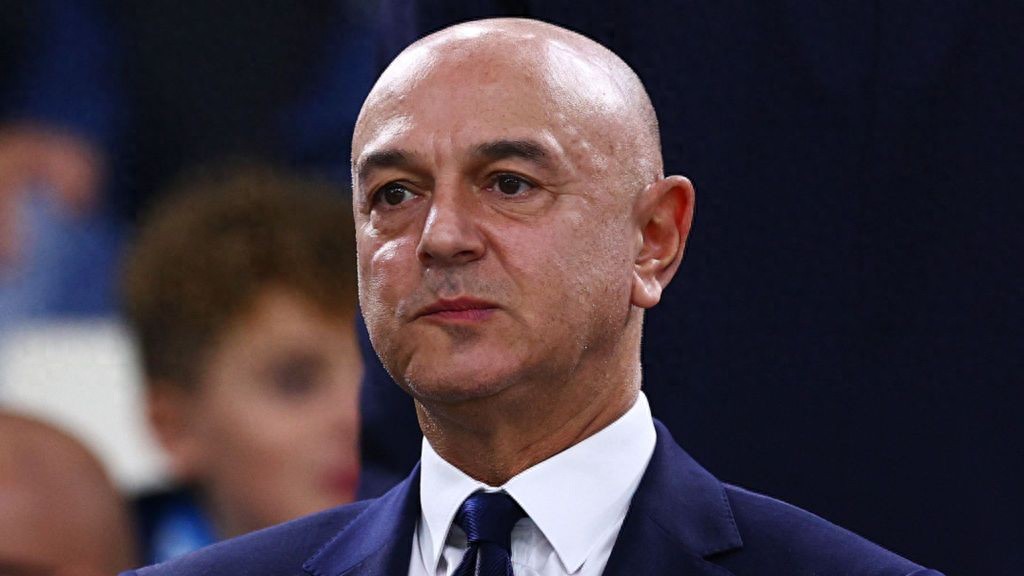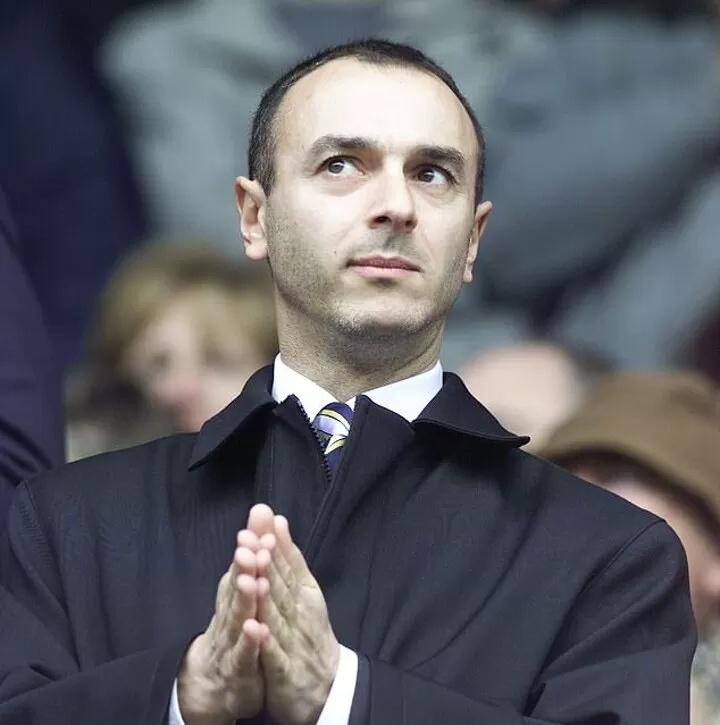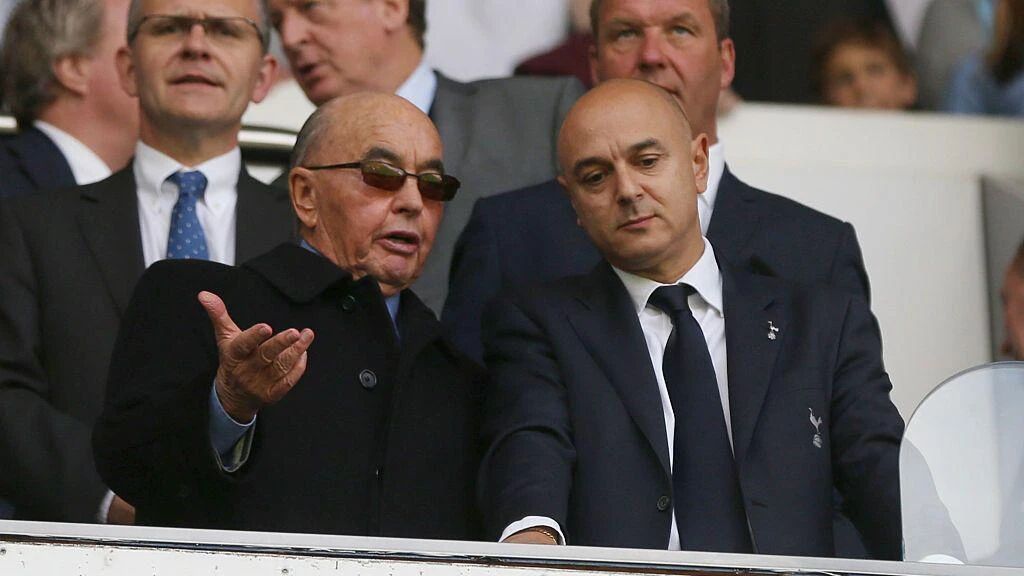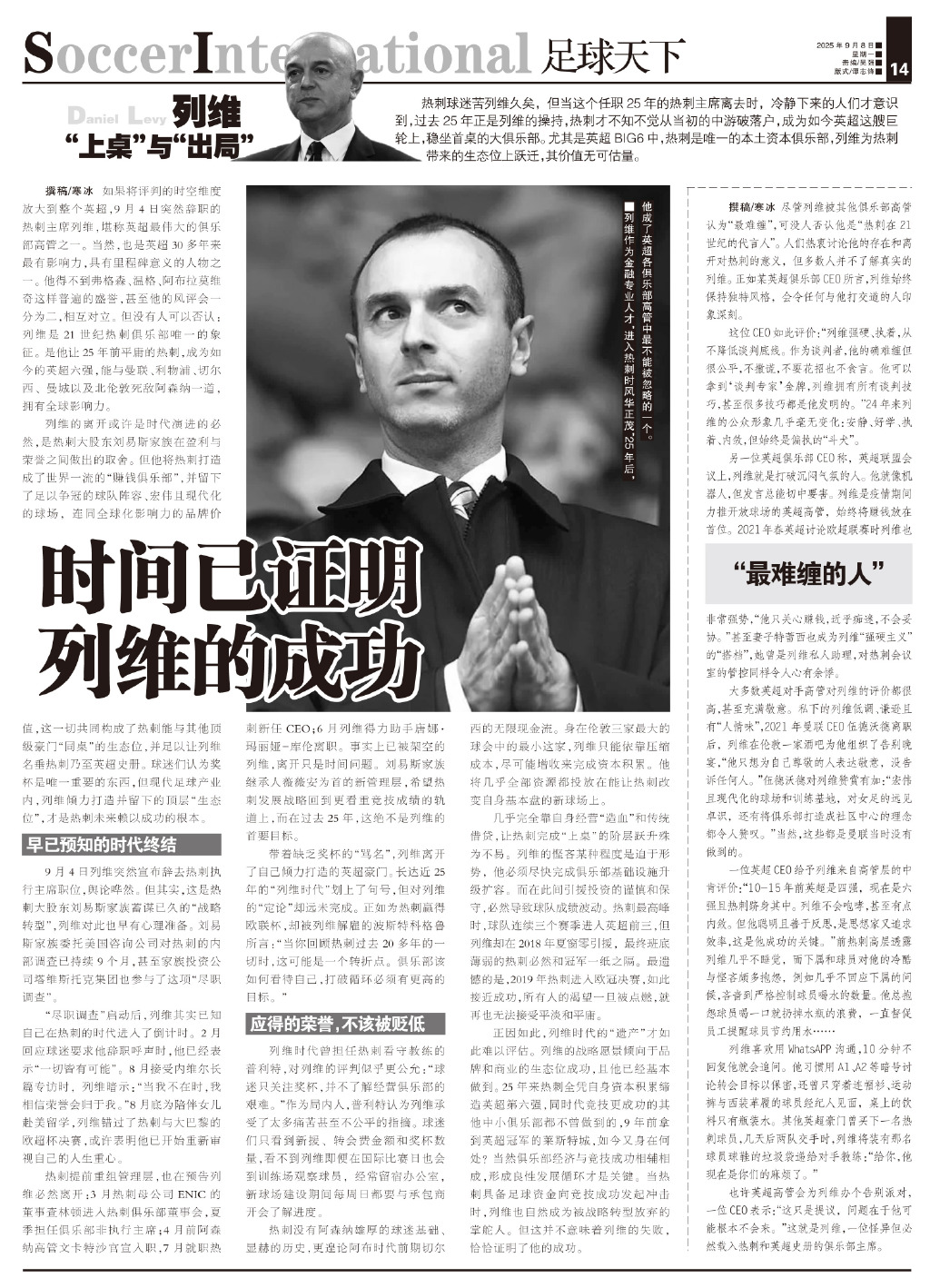[Levy’s “Rise to Power” and “Exit”] Tottenham fans have long endured Levy’s tenure, but when the chairman who served for 25 years stepped down, a calm reflection made people realize that it was precisely under Levy’s management that Tottenham quietly transformed from a mid-table struggling club into one of the Premier League’s leading giants seated firmly at the top table. Especially among the Premier League’s Big Six, Tottenham is the only club with local ownership, and Levy’s role in elevating the club’s ecological status is invaluable.

Written by Han Bing If we broaden the perspective to the entire Premier League, Levy, who suddenly resigned on September 4, stands as one of the greatest club executives in Premier League history. He is also among the most influential and milestone figures in over 30 years of the league. While he may not enjoy the universal praise of Ferguson, Wenger, or Abramovich, and his reputation is often divided and contested, no one can deny that Levy is the sole symbol of Tottenham in the 21st century. He transformed a mediocre Tottenham from 25 years ago into one of the Premier League’s top six, sharing global influence alongside Manchester United, Liverpool, Chelsea, Manchester City, and archrivals Arsenal.
Levy’s departure may be an inevitable evolution of the times, a choice by Tottenham’s major shareholder, the Lewis family, between profit and honor. However, he built Tottenham into a world-class “money-making club,” leaving behind a championship-contending squad, a grand and modern stadium, and a globally influential brand. All these elements combined secure Tottenham’s place at the top table alongside other elite clubs, ensuring Levy’s legacy in both Tottenham’s and Premier League’s history. Fans may believe trophies are the only thing that matters, but in modern football, the top-tier “ecological niche” Levy created and left behind is the foundation for Tottenham’s future success.

Levy’s sudden resignation as Tottenham’s executive chairman on September 4 shocked the public. In reality, this was a long-planned “strategic transformation” by Tottenham’s major shareholder, the Lewis family, and Levy was mentally prepared for it. The Lewis family had commissioned a nine-month internal investigation of Tottenham by an American consulting firm, with their investment company, Tavistock Group, also involved in this “due diligence.”
After the “due diligence” began, Levy was already aware that his era at Tottenham was counting down. In February, responding to fans’ calls for his resignation, he stated “anything is possible.” In August, during a lengthy interview with Neville, Levy hinted, “When I’m gone, I believe the honor will belong to me.” At the end of August, he missed the Tottenham vs. PSG UEFA Super Cup final to accompany his daughter to study in the US, perhaps signaling a shift in his life priorities.

Tottenham’s early management reshuffle also foreshadowed Levy’s inevitable departure: In March, ENIC director Charlton joined Tottenham’s board and became non-executive chairman in summer; in April, former Arsenal executive Venkatesh was announced as Tottenham’s new CEO starting July; in June, Levy’s trusted aide Donna-Maria Cullen resigned. Effectively sidelined, Levy’s exit was only a matter of time. The new management led by Lewis family heir Vivian aims to steer Tottenham’s development strategy back toward prioritizing competitive results, which was not Levy’s main focus over the past 25 years.
Carrying the “scorn” of lacking trophies, Levy left the Premier League powerhouse he built with great effort. The nearly 25-year “Levy era” has ended, but the final judgment on Levy is far from complete. As Postecoglou, who won the Europa League with Tottenham but was dismissed by Levy, said: “Looking back at Tottenham’s past 20+ years, this might be a turning point. The club must redefine itself and break the cycle by aiming higher.”

Pritchard, who served as Tottenham’s caretaker coach during the Levy era, seems to offer a fairer assessment: “Fans only focus on trophies and don’t understand the difficulties of running a club.” As an insider, Pritchard believes Levy endured much pain and unfair criticism. Fans only see new signings, transfer fees, and trophy counts, but overlook that Levy would visit training grounds even on international breaks, often stay overnight at the office, and meet contractors every Sunday during the stadium construction to monitor progress.
Tottenham lacks Arsenal’s strong fan base and illustrious history, not to mention Chelsea’s unlimited cash flow during the Abramovich era. As the smallest of London’s three biggest clubs, Levy had to rely on cost cutting and maximizing revenue to accumulate capital. He invested nearly all resources into a new stadium that fundamentally changed Tottenham’s core structure.

Almost entirely relying on self-generated income and traditional loans, Tottenham’s leap to the “top table” was no easy feat. Levy’s frugality was partly forced by circumstances; he had to quickly complete the club’s infrastructure upgrades and expansion. The cautious and conservative approach to transfers inevitably caused fluctuations in team performance. At Tottenham’s peak, the team finished in the Premier League’s top three for three consecutive seasons, yet Levy made no signings in the 2018 summer window, resulting in a weakened squad that narrowly missed the title. The most regrettable moment was the 2019 Champions League final, so close to glory, igniting desires that could never accept mediocrity again.
Because of this, the “legacy” of the Levy era is difficult to evaluate. Levy’s strategic vision favored brand and commercial ecological success, which he largely achieved. For 25 years, Tottenham built itself into the Premier League’s sixth power purely through internal capital accumulation — something other successful mid-tier clubs of the era have not done. Where is Leicester City, Premier League champions nine years ago, now? Of course, economic and competitive success complement each other to form a virtuous cycle. When Tottenham is ready to invest football funds into sporting success, Levy naturally becomes the helmsman abandoned by strategic transformation. But this does not mean Levy failed; on the contrary, it proves his success.
























 Links
Links
 Contact
Contact
 App
App


